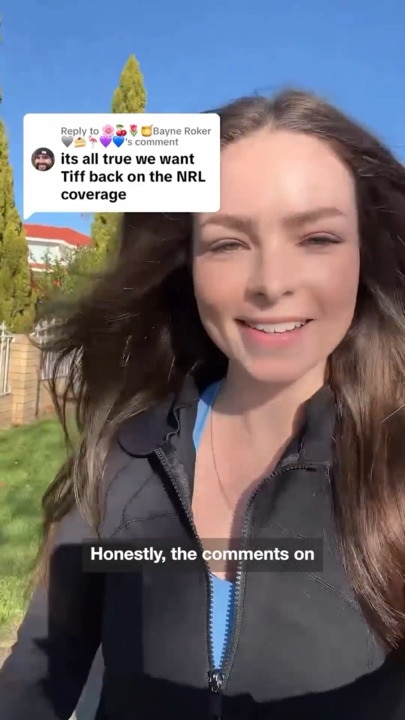Beloved NRL presenter opens up about explicit deepfake picture scandal
A beloved NRL presenter who was viciously targeted in an explicit AI-generated deepfake has called for authorities to step in.

NRL presenter Tiffany Salmond, who was targeted in a vile AI-generated deepfake aimed to “publicly humiliate” her, has called for authorities to criminalise the act of creating and distributing the “deeply violating” content.
The reporter has become a fan favourite in recent years, largely thanks to her sideline coverage of New Zealand Warriors games as part of Fox League’s coverage.
FOX LEAGUE, available on Kayo Sports, is the only place to watch every game of every round in the 2025 NRL Telstra Premiership, LIVE with no ad-breaks during play. New to Kayo? Get your first month for just $1. Limited-time offer.
But the infatuation with the reporter turned ugly last month when Salmond came across a recent bikini snap doctored into a fake video of her performing explicit acts.
Speaking out about the ordeal on Instagram, Salmond said it was both “surreal” and “shocking”.
“To actually see photos of myself – ones I had posted confidently on social media – turned into videos where I’m moving and doing explicit actions, was surreal,” Salmond said.
“If deepfakes were purely about attraction, we would see women making them about men, but we don’t – and it’s because in those dynamics, that power imbalance doesn’t exist.
“We live in a society where men can’t get enough of women’s bodies, but it’s only when they get a sneaky view that they weren’t meant to see.”

After dealing with the initial shock of the whole saga, Salmond has decided to speak out against the perverse action, calling for the creation and sharing of sexualised deepfakes without a person’s consent to be criminalised.
“Creating sexually explicit deepfakes of real people – without their consent – is a deeply violating act. The creation is the insidious part – sharing is easy,” Salmond told The Sunday Telegraph.
“ … I’d bet almost no one is creating them purely for their own private enjoyment — and even if they were, the thought of that is still incredibly violating.”

The NRL presenter said the deepfakes were circulated on several private forums where users used VPNs to keep their real identities hidden.
And while the presenter said the attempt to “degrade and humiliate” her through the creation and distribution of the video failed, she wants to help prevent others from deepfake AI attacks.
“Having a deepfake made of an innocent photo is incredibly frightening for most women — and rightly so,” Salmond continued.


“While I personally haven’t felt the full emotional weight of it this time, I want to use my voice to speak up for the women who do.”
Salmond’s saga comes after NRLW superstar Jaime Chapman revealed she too had been a victim of a deepfake AI attack.
The Titans winger hit out after seeing doctored images of herself swirling around cyberspace, prompting a police investigation.
The 23-year-old told her 86,000 Instagram followers that it was not the first time images she shared on social media had been distorted through deepfake AI programs.
“Have a good day to everyone except those who make fake AI photos of other people,” she posted, with a picture of what appeared to be a distorted AI picture.
She also added: “Next time think of how damaging this can be to someone and their loved ones.
“This has happened a few times now and it needs to stop.”
Alongside the bikini pic, Chapman wrote: “AI is scary these days”.


Gold Coast later released a statement stating they are working alongside the NRL Integrity Unit and NSW Police to trace the origin of the deepfake AI doctored images.
“Jaime is an incredible role model for not just our club, but for the game as a whole,” Titans CEO Steve Mitchell said in a statement.
“Not only is she a star on the field with the Titans and the Blues, but her continued work in the community is exemplary as she continues to inspire young girls of all ages on and off the field.
“It’s hugely disappointing to see her victimised in this way and we will continue to support Jaime and work with the NRL and authorities on this matter.
“We will always stand up to online bullying and the creation of such defamatory false content that Jaime has been subjected to, and I wholeheartedly join with her in condemning those who have produced such vile material.”

What is deepfake AI?
Deepfake AI videos are synthetic media created using artificial intelligence, particularly a branch of machine learning called deep learning.
These videos convincingly alter or generate footage to make it appear that someone is saying or doing something they never actually did.
This is typically achieved by training algorithms on large amounts of video and audio data of a person, allowing the AI to mimic their facial expressions, voice, and mannerisms with startling realism.
While the technology has legitimate uses — such as in film production, gaming, or even education — deepfakes are more commonly known for their misuse.
They’ve been used to spread misinformation, impersonate public figures, and create non-consensual explicit content, particularly targeting women.

Australian school students are facing the terrifying threat of disturbing fake nude photographs with their faces being circulated online.
Cybersafety expert and former police officer Susan McLean said creating sexually explicit, AI-generated images is now as easy as uploading a clothed photo of someone and choosing a pose for an app to then spit out a pornographic image, and it will only become more of a problem.
Sending real or fake nude images of people under the age of 18 is a crime, but the harsh reality is, “there is nothing any person can do to protect themselves from this,” Ms McLean told news.com.au.
“You have to hope that someone doesn’t choose you to become a victim; you have to hope that the offender doesn’t offend,” she said.
More Coverage
Ms McLean said instead of trying to fight the apps that create the content, the focus needs to be on educating young men on respectful and lawful behaviour.
“Victims of this crime need a lot of support and consistent and ongoing support. And it is never their fault whatsoever,” Ms McLean said.
“We’ve got to do something to change the mindset of young men who believe this is a good idea to do.”






